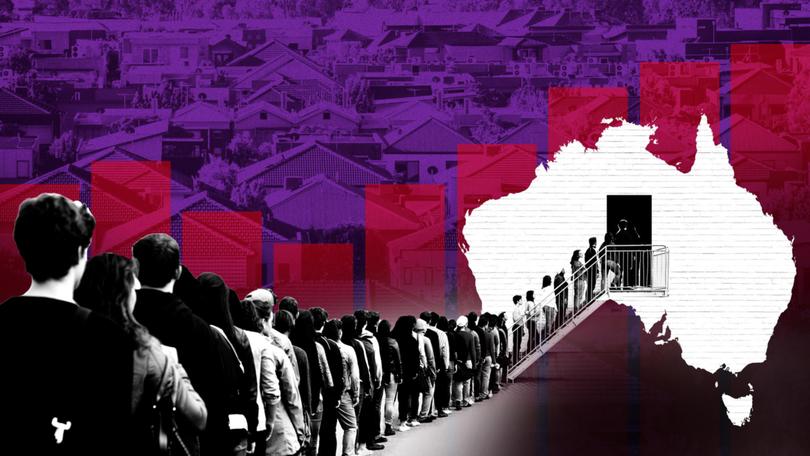JENI O’DOWD: Close the borders, Australia’s immigration policy desperately needs a reality check
JENI O’DOWD: I am proud to be part of Australia’s rich cultural tapestry, and many of my friends are great examples of Australia’s diversity, but our immigration policy desperately needs a reality check.

Lock the doors. Shut the gate. Close the borders. Australians have had enough.
Before all the woke folks out there jump down my throat, let me be clear: I am proud to be part of Australia’s rich cultural tapestry, and many of my friends are great examples of Australia’s diversity.
Our multicultural fabric has enriched our culture, economy, and identity. But even the most welcoming country has its limits.
Sign up to The Nightly's newsletters.
Get the first look at the digital newspaper, curated daily stories and breaking headlines delivered to your inbox.
By continuing you agree to our Terms and Privacy Policy.I’m not calling for a complete stop to immigration. But I am saying our immigration policy desperately needs a reality check. Our cities are bursting, housing affordability is a distant memory, and essential services are stretched to the limit. Finding a decent place to rent is becoming a joke.
The pressure is palpable. And not only is immigration shaping up to be a key Federal election issue, but the stark differences between Labor’s and the Coalition’s policies could give Peter Dutton a fighting chance of becoming our next prime minister.
About 20 years ago, Australia’s annual permanent migration intake was around 88,000. A decade later, it had increased to around 200,000 to bolster the economy by expanding the workforce.
But the real shock came in the 2022–23 financial year when ABS figures revealed Australia recorded around 737,000 migrant arrivals, a massive 73 per cent increase from the 427,000 arrivals in 2021–22.
That’s more than three-quarters of a million people entering Australia who were not brought up with our ethics and values. This is at a time when young people in particular are struggling with soaring house prices, and the rental market is in crisis, especially in Sydney and Melbourne.
It’s at a time when we can’t pay our electricity bills and dread going to the supermarket because prices seem to go up, yet again, every week.
It’s at a time when some Aussies don’t go to the doctor or dentist as they simply can’t afford to.
The Government said the figure was an anomaly, driven by the reopening of borders after the COVID pandemic, which led to an influx of international students and workers. But anomaly or not, all those people needed housing, jobs and access to services.
The figures also showed that the high net migration level was due to people remaining in Australia instead of leaving. Why would they want to leave when we offer relative stability in an increasingly unstable world?
The Scanlon Foundation’s 2024 report, released on Tuesday, reveals the growing concerns many of us have about immigration levels and its impact on housing and the economy.
It found that nearly half of Australians (49 per cent) believe immigration levels are too high, an increase from 33 per cent in 2023.
This increase comes as cost-of-living pressures dominate, with 41 per cent of Australians describing themselves as “poor or struggling to pay bills”.
Significantly, these attitudes are driven more by economic and housing anxieties than by opposition to multiculturalism — despite what the Left would tell you — with the report saying 85 per cent of Australians agreed that multiculturalism was good for the country.
This is why the issue will be scorching hot at the next Federal election: Australians are hurting (we are not a bunch of racists, as some would say) and want solutions, not glib promises.
The Coalition has already identified this, pledging to reduce the annual migration intake to 140,000 — or 25 per cent — with a gradual increase to 160,000 over the following two years.
It also promised a Coalition government would “implement a two-year ban on foreign investors and temporary residents purchasing existing homes in Australia”.
Meanwhile, the Albanese Government has set the 2024–25 Permanent Migration Program Planning Level at 185,000 places, with its plan to limit new overseas student enrolments in tatters.
In a rare alliance, the Coalition has sided with the Greens and independents to block Labor’s plan to limit new enrolments from overseas students to 270,000 in 2025.
It said the proposal was a “piecemeal approach” that did “nothing to address the structural issues it has created”.
This alliance underlines a growing consensus that Australia needs a more comprehensive immigration plan — something independent Senator David Pocock articulated perfectly when he said: “We need to have a plan for immigration and what that means for housing and pressures on infrastructure, all the other things that Australians are concerned about.”
That plan should also include stricter guidelines on who we let in. According to the Committee for Economic Development of Australia, recent migrants have increasingly been employed in lower-productivity jobs, despite the government’s emphasis on skills.
It says unemployment rates for skilled migrants remain higher than for Australian-born workers, and international graduates face significantly lower employment rates and salaries, highlighting a mismatch between migrants’ skills and available jobs.
Recent migrants also accounted for a dismal 2.8 per cent of the construction workforce. Why aren’t we targeting migrants to help build the desperately needed public and private housing?
We need to be strategic about the types of skills we prioritise. Industries like healthcare, construction, and technology face critical shortages.
Skilled tradespeople are essential for tackling the housing crisis, and by attracting software developers, data scientists, and engineers, we can become a global leader in innovation.
When people struggle to pay the weekly grocery bill, any policy to ease the pressure of living costs, like reducing migrant intake, can easily sway a voter’s decision at the ballot box.
The debate around immigration isn’t just about numbers; it’s about values, priorities, and what kind of country we want Australia to be.
